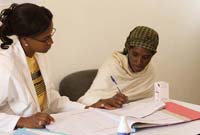Recording health education activities
Recording and reporting all your health education activities is very important, and you must record all your routine health education activities according to the standard documentation guidelines provided for you (Figure 15.5). It is usually considered that an activity which is not recorded has not been done. So, if you fail to document or record the activities you have accomplished, others will not know whether or not the activity has been performed.

Likewise, if you fail to record activities, you cannot evaluate and monitor your achievements. As well as recording the activities, you should also report your health education activities to the concerned bodies, like the local health centres, and the woreda health office. You should keep others informed about the progress of your activities so that they can give you any necessary support and help. Health education activities are usually reported in standard reporting format. If standard reporting format is not available to you, you can record the activities in your own registration book, and later you should be able to replace it with the standard reporting format, when it is made available for you to.
Look carefully at Box 15.1. It describes health education activities which should be recorded.
Box 15.1 Recording health education activities
During the implementation of a health education activity, the following information should be recorded:
- Number of people who received health education (total, male, females)
- The topic addressed, and the content of the message
- The place where the health education activity was delivered
- The person who delivered the health education session
- The materials used (posters, leaflets, etc.)
- The method used (discussion, drama, etc.)
- Number of households reached or covered
- Number of health education sessions delivered
- Were any problems encountered?
Mrs Chaltu is a Health Extension Practitioner. She is working in Maru kebele. She conducts home visits three times per week. During her home visits, she educates the families that she visits about family planning and how to prevent communicable diseases. Using Box 15.1 above to help you structure your answer, write down how Mrs Chaltu should record her health education activities.
Ideally, she should record all the health education activities she has undertaken for example, the number of households visited, the number of people given health education at home, the methods and materials used, the messages disseminated, the number of mothers receiving health education on family planning and communicable diseases, and any other details of problems that have arisen.
Recording the problems you have come across is such an important thing to do. Solving problems is one of the key ways we all learn, and so if you note your problems and what you did about them, you are also recording your own learning!